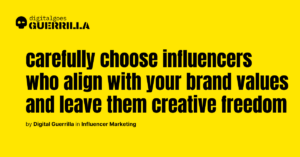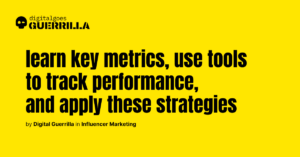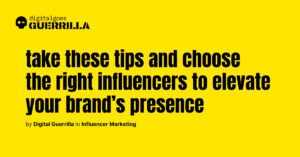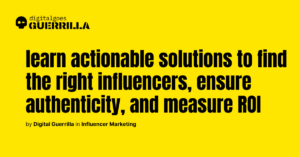Influencer marketing is a cornerstone for brands looking to connect with their audience on a personal level. However, as the influencer space grows, one factor has risen above the rest: authenticity. Gone are the days when influencers could simply mention a product without creating a real connection. In today’s market, consumers demand transparency and trust.
In this blog post, let’s explore why authenticity is essential in influencer partnerships and how it can be a game-changer for your brand.
What Does Authenticity Really Mean in Influencer Marketing?
Authenticity in influencer marketing goes far beyond promoting products. It’s about influencers forming genuine connections with their followers. When influencers choose to endorse products that align with their personal values and lifestyle, their promotions resonate more deeply. This leads to better engagement, as audiences can sense when a recommendation is heartfelt versus when it’s simply paid for.
For example, an influencer who regularly posts about sustainable living and then promotes eco-friendly products aligns naturally with their content. Their audience expects these kinds of endorsements, so they’re more likely to trust the partnership and, ultimately, the brand.
Read how do you identify and choose influencers for a marketing campaign
How Authenticity Builds Trust and Long-Term Success
Authenticity is the cornerstone of trust, and trust is what converts followers into customers. When influencers are authentic, they develop credibility with their audience. Followers look to them not just for entertainment but for advice and recommendations on products they can genuinely use in their lives. This level of trust leads to deeper connections and more meaningful engagement, which is exactly what brands should aim for.
Take the example of beauty brand Glossier. Instead of relying on mega-influencers, Glossier collaborated with everyday customers and micro-influencers who already used and loved their products. These partnerships felt authentic because the influencers had genuine connections to the products. As a result, the brand grew a loyal fan base that continues to engage with and promote their offerings.
Warning: The Risks of Inauthentic Influencer Collaborations
Unfortunately, not all influencer partnerships are created equal. When brands and influencers choose to collaborate for the wrong reasons—whether it’s purely for financial gain or without considering audience alignment—the partnership risks feeling forced or inauthentic. And this can have a negative impact.
Inauthentic partnerships often lead to skepticism, where followers start questioning the influencer’s motives and the brand’s credibility. This was the case with Pepsi’s controversial ad campaign featuring Kendall Jenner, where the lack of genuine connection to the cause being promoted led to a significant backlash. Audiences rejected the collaboration because it felt disingenuous and opportunistic.
How to Spot an Authentic Influencer Collaboration
When it comes to influencer partnerships, how can you tell if it’s authentic? There are a few key indicators to watch for:
- Aligned Values: Choose influencers whose personal brand aligns naturally with your products. Their existing content should indicate that your brand is a natural fit.
- Audience Engagement Over Follower Count: Look for influencers who have strong, quality engagement with their audience—think meaningful comments and discussions rather than just likes and views.
- Storytelling Over Selling: Authentic influencers focus on weaving your product into their stories. They share how it fits into their lives, rather than treating the endorsement as a sales pitch.
Brands can use these indicators as a checklist when evaluating potential influencer partnerships, ensuring that the collaboration feels organic and real.
Learn more about the role of storytelling in digital marketing
Practical Strategies for Building Authentic Influencer Relationships
To cultivate authentic relationships with influencers, brands need to take a thoughtful, long-term approach. First, research is key. Before reaching out, take time to understand the influencers’ values and the type of content they produce. Do they align with your brand’s mission? Does their audience resemble your target market?
Next, aim to foster long-term relationships rather than one-off deals. When an influencer works with your brand over time, their endorsement feels more genuine. This was one of the strategies behind Daniel Wellington’s success. By forming ongoing partnerships with micro-influencers who genuinely loved the product, they were able to maintain a high level of authenticity, resulting in consistent engagement and brand loyalty.
Finally, collaborate on content creation. Influencers know their audience best, so allow them the freedom to create content in their own voice. By giving them creative control, the partnership will come across as more natural, rather than a forced advertisement.
Read how can you use user-generated content in a marketing strategy to learn how extend life and performance of content created by influencers and your audience
Boosting ROI: How Authenticity Directly Impacts Your Marketing Results
Authentic influencer partnerships do more than just build trust—they also drive results. Research has shown that influencers who prioritize authenticity in their content tend to have higher engagement rates and better conversion rates. A study by TapInfluence revealed that influencer marketing campaigns that focused on authentic endorsements delivered 11 times higher ROI than traditional digital marketing efforts.
When influencers form genuine connections with your brand, their followers are more likely to become loyal customers. The result? Not only do you increase short-term sales, but you also build long-term brand loyalty, which pays off over time.
For further reading check the article how can you measure the ROI of an influencer marketing campaign
Future Trends: The Growing Demand for Authentic Influencer Partnerships
As influencer marketing continues to evolve, the demand for authenticity will only grow. Micro and nano-influencers, who are known for their close-knit relationships with followers, are gaining popularity because of their genuine approach. These influencers typically have smaller audiences, but their engagement is far more meaningful, making them valuable partners for brands focused on authenticity.
In addition, consumers are becoming more savvy about spotting inauthentic collaborations, and they’re quick to call out influencers and brands when a partnership feels insincere. The future of influencer marketing lies in transparency, long-term relationships, and authentic, value-driven content.
Conclusion: Authenticity Isn’t Just Important—It’s Non-Negotiable
In today’s influencer marketing world, authenticity is no longer optional. Brands that prioritize genuine, meaningful partnerships will see higher engagement, build trust with their audience, and achieve long-term success. By carefully choosing influencers who align with your values and allowing them the creative freedom to tell their own stories, your brand can leverage the true power of influencer marketing.
Invest in authenticity today, and watch your influencer marketing efforts flourish.
Read more about influencer marketing 🔽
- How to comply with disclosure and transparency regulations in influencer marketing?

- Why authenticity in influencer partnerships is important?

- How to measure the ROI of an influencer marketing campaign?

- How do you identify and choose influencers for a marketing campaign?

- What challenges can arise in influencer marketing, and how do you address them?
